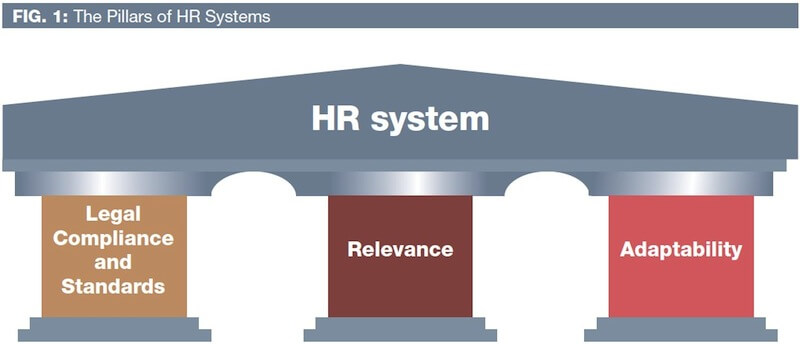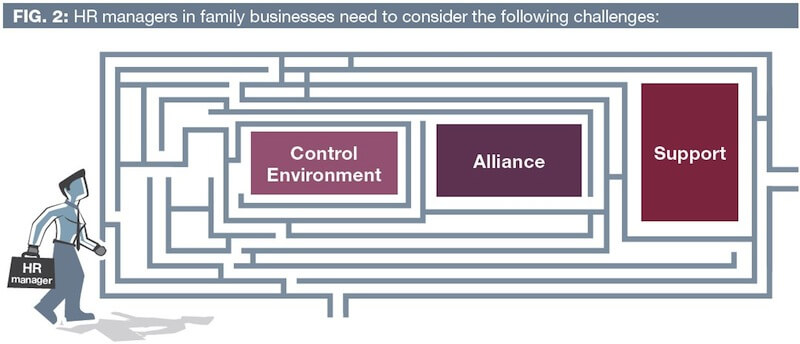The Nuqul Group is one of the largest family-owned company in Jordan and the Middle East and has just celebrated its 60th anniversary. A business family is often mentioned in relation to its external achievements such as the establishment of brands, acquisitions, mergers, projects, and community involvement. Undoubtedly, however, when faced with six decades of success the real question is what is happening on the inside that makes such a family business work. Nicola Billeh, Group HR Director of the Nuqul Group, analyses the ingredients for success of HR systems in a family business, gives insights into the Nuqul Group’s yearly HR meeting, and shows how HRM should be a change agent for organisations.
The Pillars of HR Systems
Human resources are the most valuable capital an organisation possesses. It is, therefore, imperative that Human Resource Management (HRM) is proactive and progressive and addresses the organisation’s dynamic needs. Businesses that recognise this imperative enable a better working environment wherein they become change agents, can successfully structure compensations and benefits, and create room for talent management and career growth.
In reality, the workforce has evolved and become more diverse, and companies count on their HR managers to consider ways to meet the divergent needs of an increasingly complex world. The HRM profession is evolving and it has shifted its focus to meet these changing requirements.
In my view, the most important pillars for a successful HR system are:
1. Legal Compliance and Standards: The HR systems of any organisation must be in full compliance with the national labour laws as well as any other related legal guidelines. In addition, HR systems must live up to global HR practices including but not limited to EEO (Equal Employment Opportunity), Affirmative Actions, and Fairness.
2. Relevance: HR systems have to serve, support, and enable the vision and strategy of an organisation. This is the only way HR can be considered a strategic partner and can have an impact on the organisational scorecard. HR managers, must fully understand the business and its stakeholders.
3. Adaptability: For the HR system to function as a change agent, it needs to be adaptable. There is no point in having a system that is legally sound and adapted to corporate strategy but that cannot be adopted or implemented.
Some HR professionals refer to below activities as the pillars of HR. I tend to consider them enablers and fundamentals of HR functions and believe that they have to be founded on the three pillars we defined above:
1. Recruitment and Selection
2. Learning and Development
3. Compensation and Benefits Administration
4. Policy Administration
HR Systems in Family Businesses
Family-owned and/or -run businesses represent the majority of the business community in many countries around the world. It is, therefore, crucial for HR leaders to understand the special considerations and uniqueness of family businesses. However, the degree of adaptation often varies depending on the maturity of the business and the governance system in place.
I think HR managers in family businesses need to consider the following challenges:
Control Environment: It is important that the family business owners give HR managers the autonomy to act. To what extent do the heads of HR have the authority and empowerment to take strategic decisions? In order to create such an environment, compliance, systems, and frequent overviews need to be delivered to the family.
Alliance: Acting as the change agent, taking the strategic partner role, and providing expertise are key to drafting HR strategies in a family business. HR managers in family firms have to collaborate with the family and earn credibility as trusted advisors, which will make the HR system succeed.
Support: It is important for HR managers to create harmony between all stakeholders and keep the balance between organisational and personal objectives. This can only be done by supporting the strategy of the organisation and at the same time communicating with the family and non-family members who implement it.When families are setting up their human capital strategy, it is important for them to understand and practice the separation between ownership and management as well as between the family’s social principles and the business operations.
This separation has to be fully implemented in all aspects of HR, starting from the selection and recruitment of employees, to their learning and development, to compensations and benefits, and ending with the cultural transformation from the “family” culture to the desired “business” culture. This separation requires the building of trust and empowering the human capital strategy throughout the organisation.
HR strategies in the Nuqul Group
Every year the HR teams of the Nuqul business units from different countries meet to agree on strategic plans, report results, and discuss HR activities. This year our meeting was special since the Nuqul Group was celebrating its 60th anniversary. After separating ownership and management in 2004, the group experienced solidification and the “institutionalisation era”, which included the creation of many systems and procedures not only to build the control environment but also to capture and maintain the corporate values of the group. This phase took almost six years and part of the group’s continuous improvement was to create new business drivers to overcome the challenges it faced in the past.
Our regional HR meeting focused on communicating and implementing the new business (Xi) drivers. The following business drivers and enablers were created to enhance some of the main characteristics of the Nuqul Group during the institutionalisation era:
iMaster (only the best): When everyone masters his/ her role, the group will provide first class products and services.
iTeam (together we can): This stands for a straight forward formula: 1+1 is more than 2 meaning that combined efforts amount to more than individuals pursuing goals alone.
iDeliver (to the dot): Each team member in the group delivers exactly what is requested from him/ her.
iZoom (faster than the rest): Competition is a race and we have to be the first always, reshape our core values (Our World, Our Soul and Our Pride), maintain a culture change program, and implement the improved and enhanced methodology for talent management.
In addition to elaborating these drivers, the Nuqul HR team members presented the challenges they met during the previous year and shared their experiences, best practices, and future plans.
In the Nuqul Group we consider HR as a strategic partner to the organisation. Its main purpose is to add value and positively impact the organisation’s results in both the short- and long-term. Especially, in uncertain economic times, HRM is of more importance than ever: HRM should make sure that it is helping the organisation to survive through difficult times by optimising its operations and utilising resources efficiently, bearing in mind the importance of satisfying the organisational needs through retaining and developing its internal capacities. The HR strategy should be focused on people and stakeholders and clearly communicated to all related parties to ensure its success and effectiveness. It should not be separated or isolated from the business needs and requirements; they should work hand in hand to ensure the success of the organization.
Tharawat Magazine, Issue 14, 2012
Original article posted on Tharawat Magazine


